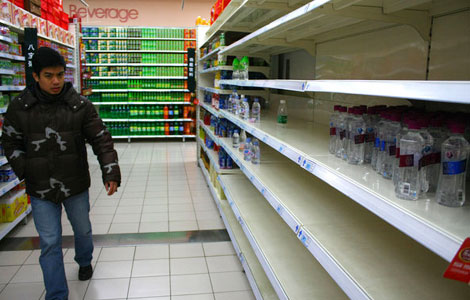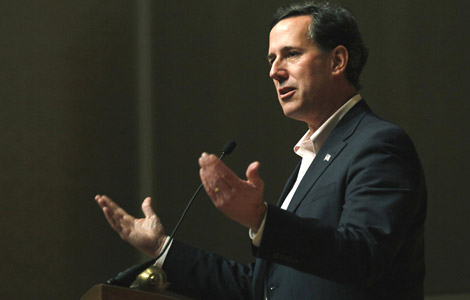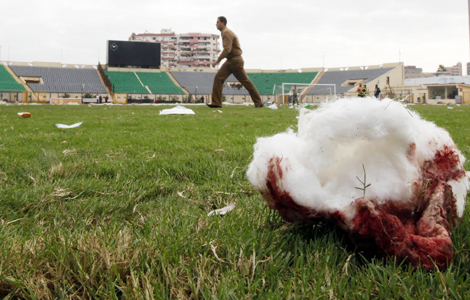Farmer-turned workers settle in urban home
Updated: 2012-02-08 16:12
(Xinhua)
|
|||||||||
CHONGQING - After around 12 years of working as a migrant in cities, farmer-turned worker Gao Jianhua finally settled in Chongqing, a populous city in southwest China -- proudly, as an urban citizen.
A husband and father of two, the 29-year-old native of Fengjie county on the outskirts of Chongqing now lives with his family in an apartment specially created with government funding for low-income earners to rent, at last obtaining a stable residence.
Gao moved into the 80-square-meter housing unit 10 months ago, where he spent the outgoing Spring Festival with all his family together for the first time in a city, after three consecutive years of separation from his family.
"It's much better than in the rural areas, and the rooms are bright and spacious, enough for our whole family to live together, " said Gao's mother Tang Gongzu, who had lived in the countryside for the past 50 years.
Gao is one of the 164 million Chinese who have migrated to cities from rural areas and helped fuel growth in the world's second largest economy. But they have long been struggling to settle in cities due to their status as farmers.
The number of people living in cities exceeded the rural population for the first time in 2011, accounting for 51.27 percent of the country's population of nearly 1.35 billion, according to official figures released in January.
The historic population shift in China, which used to be an agrarian nation for centuries, has diverted policymakers' attention to helping migrant workers get along with urbanites and adapt to city life.
Gao had lived in an abandoned factory building before he was able to rent the three-bedroom apartment open for low-income earners at a rent rate of 60 percent of market price.
"My kids used to stay in the countryside with my parents, because the previous place was poky and dusky," he said.
In order to improve housing for millions like Gao, the Chongqing municipal government began public housing projects in 2010, aiming to provide 800,000 housing units for low income earners to rent by 2015.
Gao, now a driver with a monthly income of 2,000 yuan ($316), is working hard to earn money with the hope of buying the public-rent apartment that currently houses his family.
Under government regulations, a tenant can buy such an apartment after renting it for five consecutive years at a price parallel to the flat's construction cost.
Chongqing's endeavor to speed up migrant workers' settlement in the city also includes granting them urban residency, thus ensuring them full access to public resources, including health care, social insurance and education.
By becoming urban residents, Gao made it possible for his two kids to receive education at urban schools, which usually have a better faculty and more funding than their rural counterparts.
Gao's 5-year-old daughter has been admitted to a nearby public kindergarten where she can study dancing and singing.
"But the village school in our hometown could only offer two courses, Chinese and math," said Gao's mother.
According to Chongqing's municipal regulations, farmers who work or run businesses in urban areas for up to three years can apply for urban residency.
The municipal government said it aimed to turn 3 million farmers into urban citizens by 2012 and 10 million altogether by 2020.
Chongqing's broad social experiment is part of China's overall effort to realize the settlements of tens of millions who have migrated to cites to tap opportunities from rapid economic growth.
South China's Guangdong province also provides new channels for people to be registered as a resident as long as they meet certain criteria, such as having worked there for a certain number of years and having paid their social security.
China has vowed to give the country's migrant workers greater access to urban community-based public services and help them better adapt to life in the city.
A Ministry of Civil Affairs guideline published January urges efforts be extended for public services in urban communities, including employment, public health, social insurance, legal aid and educational services, to cover migrant workers living in urban areas.After more than a decade's hard work in Chongqing, Gao finally got a new home in the city.
"With my parents and kids staying with us, my wife and I can devote ourselves to earning money," Gao said. "Nothing I can imagine is more pleasant than staying together with the whole family."
Hot Topics
Kim Jong-il, Mengniu, train crash probe, Vaclav Havel, New Year, coast guard death, Internet security, Mekong River, Strait of Hormuz, economic work conference
Editor's Picks

|

|

|

|

|

|







